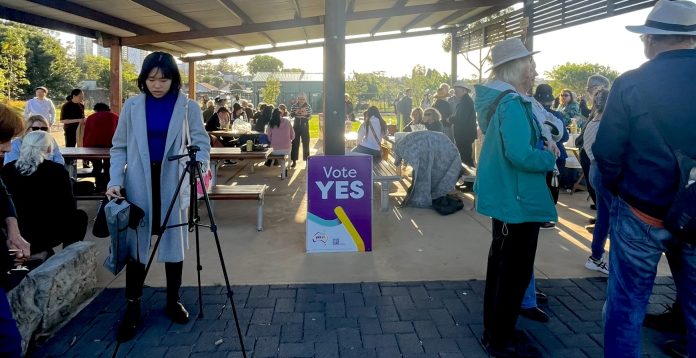There is a story I know that is lived by many. A desperate mother and a tirelessly working father, with a beaten-down suitcase, two handfuls of change and a steel-built exterior, abandoning their past and fleeing their homes for a better life on Australia’s shores.
And a better life did many of us lead. We relished a promise of equal opportunity and boundless possibilities, served to us on a platter of hard-earned winnings and diligent labour. We reaped the fruits of an unceded land and dredged unknowingly on the dirt of a blood-stained soil. As non-Indigenous inhabitants of this land, it’s time for us to recognise this country’s rightful owners and give back.
More than 120 multicultural and ethnic communities have pledged their support for the Indigenous Voice to Parliament under the Federation of Ethnic Communities Councils of Australia, but 18 per cent of non-Anglo voters still remain undecided.
Broader support for the Voice has continued to dwindle, with national polls conducted by YouGov showing a drop from 60 per cent support in March of this year to just 41 per cent in this last month. Given that more than 46 per cent of Australians have at least one parent born in another country, it’s integral to include our multicultural communities within our national dialogue to bring the referendum one step closer to the finish line.
Specifically, multicultural and ethnic communities should find empathy, rather than animosity, toward the Indigenous cause. When speaking to Linda Burney, the Minister for Indigenous Australians, at a BBQ for the Yes campaign in Wangal Park, Burney highlighted that, “multicultural Australia understands, in a real way, some of the issues facing Aboriginal people, particularly in terms of land and oppression”.
Jason Yat-Sen Li, born to Chinese migrants and the federal member for the electorate of Strathfield, corroborated Burney’s perspective: “We are migrants here. We know what it’s like to lose connection and be disconnected to our homelands.”
Community BBQ for the Voice – Jason Yat-Sen Li MP.
While JWS research suggests that those coming from culturally and linguistically diverse backgrounds were more likely to be supportive of the Voice, they were also less likely to be exposed to information relevant to it. Indeed, one attendee at the BBQ from Sydney Chinese Drum Art Troupe said: “At first, we didn’t know what was going on. Most of the people in our group is [sic] Chinese background — they don’t understand English much. If someone translated and explained in our language why we should say yes, then people will follow up. We are immigrants and we have a strong reason for why we need to say yes.”
The disconnection between multicultural communities and the broader national dialogue has proven to be much more disastrous, however, in other parts of Sydney. When following Channel Nine’s A Current Affair into the culturally rich suburb of Cabramatta in Sydney’s south west, many of those interviewed were not aware of what the Voice to Parliament even was, with many saying they “had no idea” or “didn’t know much about it”.
Misinformation was rife, with one person answering: “I don’t believe in it. Once they [Indigenous Australians] put their foot in, they’ll go straight in”. Those interviewed also took the question as more of a hypothetical scenario rather than a mandatory referendum, with another sharing that he felt it was not his place, as a non-Indigenous Australian, to answer. “I wouldn’t answer that question. It’s not fair for me to answer.” Most were much less aware that there was a mandatory referendum in two weeks, let alone whether they would be voting “Yes” or “No”.
Federal member for Cabramatta Dai Le said the Voice was “simply not a priority” for a lot of multicultural communities: “People here have other priorities. What people talk about out here is cost of living. The multicultural community, here, in Western Sydney, is struggle street. So, where does the Voice fit in into people’s lives? They’re not thinking about it.”
The general apathy toward the referendum and the broader state of Indigenous affairs is palpable within the referendum and is indicative of the continual erasure of the brutal, violent, and centuries-long colonial history of Australia.
Peter Dutton, the oppositional leader, maintained that we were “all equal” in a press conference addressing a Vietnamese-run café: “Migrants who have come to our country recently or many generations ago… this is an opportunity in this campaign to express your view, like millions of other Australians, that we are all equal.”
Similarly, Warren Mundine who is leading the No campaign, went as far as to say that migrants too, should be included in our referendum, citing the US constitution on the basis that “all men are created equal”.
To frame all Australians as “equal” largely mystifies and obscures our colonial past, and to reproduce such a narrative, especially to Australian migrants who may not be aware of such history, perpetuates a model minority myth that pits multicultural and Indigenous communities against each other, all while maintaining white superiority.
I am certainly not the first or last person to have questions about the Voice. How much can this really achieve? How much difference can a Voice to parliament really make? Will this improve the circumstances for Indigenous communities at all? But it is in our due diligence, as non-Indigenous migrants who have made this stolen land our home, to give back as much as possible to First Nations people. It begins with casting an affirmative vote in this week’s referendum, and then untangling the knotted narratives that have been tightly woven around us.


